- Home
- Andrew McGahan
Treasures of the Deep Page 18
Treasures of the Deep Read online
Page 18
But his reason recoiled from the idea. It was a concept more monstrous than the Rope Fish itself, that the act of one man, in killing a bird, could bring such a doom down about a whole ship and the six hundred men of its crew. No, if there was ill-fortune to be meted out for the slaying of the bird, then surely it would fall on Roland’s head alone …
And anyway, the capture hadn’t felt like that. It hadn’t felt like bad luck or punishment. It had felt more … preventative. As if the Fish had timed its intervention just so, to hinder the Revenge in some way. But to hinder them from doing what? Taking the Twin Islanders prisoner? But what could a few low-ranking Twin Islanders matter, especially to a deep sea creature that could have no interest in the wars of men in the first place?
No – Roland would shrug – it was all impossible. And even if it wasn’t impossible, it didn’t matter. For nothing would change the fact that here they were, bound to the Fish in permanent embrace.
At length, Pietru’s communion would come to an end, the scapegoat returning to himself and withdrawing his hand from the ropes, and likewise Roland’s thoughts would run down, having gone nowhere and decided nothing. The two of them would then resume their skulking, sunless life, Roland doling out their tiny portions of biscuit for the day, and doing his best otherwise to ignore the hunger pangs and the fear and the boredom.
It was a dismal existence. Nor could it last forever, for the first crate of biscuit was already gone, and they had begun on the second. But as miserable a life as it was, Roland – who three years earlier would have gagged in revulsion if confronted with circumstances so squalid – had long since decided it was better than the eternal nothingness that was death.
Indeed, he was dimly surprised, through his fatigue and incipient scurvy, just how resolutely the urge for life still beat in him, when there was no hope or rational reason for it. Other men, far tougher and more commanding than him, had already succumbed to despair and suicide. But Roland saw now that there was in fact an unguessed fortitude lying within him, at least as far as his own survival went. Whatever the degradation and suffering that might come, he would cling on until the very last. He did not want to die. And unlike the suicides, he could not imagine a time when he would want to die.
Decades later, of course, he would know better.
On the one hundred and sixtieth day since the capture of the ship – by Roland’s reckoning at least, but it was a reckoning he trusted, for though he was no sailor or navigator, he was still good at counting, totting up time as easily as he had once totted up money, the former, as it had proved, infinitely more valuable than the latter – he and Pietru ate the last of the biscuit.
That is, Roland ate the last of it. There were three remaining portions, and one should have gone to Pietru … and Roland had certainly intended to do that. But at the sight of those three mouldy slabs of meal, something cracked inside him and he gobbled all of them down while Pietru only watched with his mild eyes. What did it matter anymore, Roland told himself, it would make no difference to anyone now. But as soon as the last mouthful was gone, his excuses turned to ash, and he felt sick with self-loathing. It was even worse that Pietru said not a word of accusation. When Roland kicked the worthless crate away and stalked off, the scapegoat only followed as tamely as ever.
So that was that. Five months they had lingered, but now it would end. What food remained on the Revenge was in the hands of two surviving gangs: some fifty or so seamen who had barricaded themselves in the stern castle, ranged against a slightly smaller group who had fortified the forecastle. Between these two encampments, the main deck lay as a bloodstained wasteland and battleground. From the battlements at either end of the ship, scarecrow guards, bony-faced and black-lipped with scurvy, stared across at the enemy, muskets loaded with the last of the gunpowder, jealously defending their final few barrels of biscuit and flour locked away within.
Aside from these two gangs, Roland and Pietru were the only others still living on the vessel. They had the freedom now to roam the lower decks as they might, for raiding parties no longer ventured out from the fortresses – but that freedom was of little benefit. They could search the ship over and over for some scrap or crust that had somehow been overlooked, but there was nothing to find. Nor was there any use in going to the fore or aft battlements and begging for either food or admittance. Neither would be granted.
It was time thus, Roland knew, to make a decision. Either he faced death by slow starvation – and he knew hunger well enough now to know how terrible that would be – or he could chose the quick and painless way: for Roland still had his pistol with him, and its single shot.
At least – if he used the pistol – he would finally be done with Pietru. Roland’s hatred for the scapegoat had by now reached a bone-deep constancy, an utter weariness for a weight that could never be put down. Almost it was reason enough, to be free of that great, idiot face, and the child voice with its endless importuning, ‘Rowand, Rowand, Rowand …’
But Roland still couldn’t do it, couldn’t bring himself to the final brink. He had to live on, weak and pain-ridden and crippled though he was by hunger now, as day followed day and nothing changed. Knowing it was futile, he went begging at first one gang’s door, then the other, and received only sneers for reply. And knowing it was futile, he limped and then crawled around and around the ship, increasingly delirious, in the insane hope that somewhere, somehow, a single crust or rat or cockroach yet remained uneaten.
And Pietru followed, as witless as ever. Roland ached to be rid of him, to spend at least his last days of madness and pain alone. But still no insult or abuse could drive the scapegoat off, nor the weak blows that Roland occasionally rained on him. Indeed, the simpleton appeared to think that Roland’s desperate searches through the ship were almost a game, a continuation of Pietru’s own patrols. He would trail along with Roland, smiling and fondly patting the bulkheads and walls as he passed. And once a day still, he would drag Roland either by force or endless nagging to the ports on the lower gun deck, and kneel there, stroking and pulling at the white caul of the Fish, murmuring to himself in satisfaction, until his hand was eventually devoured.
Roland found this sight more nauseating every day. If only – he dreamed fervidly – if only Pietru would die first of the two of them, then Roland would be free. And the scapegoat should die first, by all that was fair, for after all he had been on half Roland’s rations through these last months.
But Pietru wouldn’t die. He didn’t even seem ill or tired. And as Roland’s hunger hollowed out within him to become an all-consuming agony, he realised that if he was to have even one final day’s peace before he died, then he would have to kill Pietru. Why, it would even be worth using the single shot of the pistol that Roland had been saving for himself.
He mustered his determination through a last dreadful night. Yes. It had to be done. And quickly. It had been nineteen days now since Roland had eaten. Waves of black dizziness assailed him constantly, and soon the darkness would claim him forever, and it would be too late. So as the hundred and eightieth dawn since their capture broke across the sea, Roland made the promise to himself. Today would be the day of his liberation.
But when to do it exactly? Pietru, even in his innocence, might take fright at Roland suddenly putting the pistol to his head. Ah, but there was one long moment every day where the scapegoat was distracted and unaware – his strange communing with the Rope Fish’s strands.
That would be the time.
So they limped through one last morning, creeping painfully a final time about the empty decks, and so came at length to the accustomed gunport. As entranced as ever, Pietru knelt and began to massage the white sheath, which gradually enfolded his hand. Roland watched in terminal loathing. It was as though the scapegoat was allowing himself to be swallowed …
But enough. It had to be now.
Roland pulled the pistol from his jacket, then loaded, primed and cocked it as silently as he could. Finally he r
aised it to the back of Pietru’s great balding head. The scapegoat was heedless. Really, Roland told himself, he was doing the simpleton a favour. They would both be released.
His grip tightened on the trigger.
Abruptly, Pietru’s head snapped around, as surely as if someone had shouted a warning, his usually gentle eyes burning and aware. He gave a single command. ‘Stop that!’ And Roland fell back, his finger gone nerveless. Somehow, in that instant, Pietru was a normal man, and furious.
‘I wasn’t,’ Roland babbled, ‘I didn’t mean …’
But already the anger in Pietru had died. The scapegoat pulled his hand free from the gunport and leaned towards Roland, his expression one now of puzzlement. ‘Rowand shoot Pietru? But why?’
‘Because we’re dying anyway!’ Roland screamed in sudden fury of his own. ‘Because there’s no more food, you fool!’
‘Food?’ The scapegoat sat back in apparent confusion. ‘Rowand wants something to eat? Rowand is hungry?’
‘Of course I am!’ Roland brandished a withered arm as evidence, fist clenched. ‘Can’t you see?’
Pietru gave a shake of his great head, as if Roland was missing something obvious. ‘If Rowand hungry, should have said so.’
The scapegoat turned again to the gunport as Roland watched in bafflement. Once more Pietru fondled and pulled at the white ropes, his expression going happy and far away.
Shoot him, Roland told himself, just get it done …
But now something was happening that he had not seen before. Instead of enfolding Pietru’s hand, the white ropes were writhing in a strange manner, peeling apart to show glimpses of daylight beyond, then rejoining again. Pietru chuckled to himself and nodded, as if in answer to a question. And then the white ropes opened a full hand’s-span wide, and something silvery appeared, drawn up from the sea below by many grasping tendrils, to be pushed through the gap. First one shape, and then another, then a third. They passed inwards and fell to the floor, each one flopping and gasping.
Roland stared in astonishment.
Fish. Three fish lay there, breathing their last.
‘Food,’ burbled Pietru happily. ‘Big Fish brings us little ones, if we ask. Go on, Rowand, I got them for you. Eat.’
Roland stared a moment more, then dropped the gun, took up the first fish, and bit ravenously into its side, not caring that it was raw and un-cleaned and un-gutted, only revelling in the sensation of blood and flesh – of nourishment – blazing rich in his mouth.
Another part of his mind was already leaping ahead with the implications. The Rope Fish! Pietru could talk to the Rope Fish, and it could feed them! They could eat. They did not need to die. They could survive. And not just for a few more days or weeks. Why, if food could be summoned at will like this, then what was to stop them going on for months longer, for years even?
Why, indefinitely!
They were saved …
And indeed they were, in one meaning of the word at least.
In time, however – years and years into the future – Roland would come to grasp the full significance of the term indefinitely, and to understand the true nature of the bargain he had just struck. He would realise then that he hadn’t been saved at all. No. Rather, the opposite.
By that far-off day, when it was too late, when he was long since weary of life and of wandering alone upon the ocean, when he was the withered captain of a ship of ghosts – by then Roland would have given anything to have his time over, and to react differently to Pietru’s miracle.
Anything.
For if he had known from the first all that he would come to know in the decades in between, he would not have eaten the fish.
Instead, he would have shot himself on the spot.
THE FISH
PART TWO
By Roland’s count, it was on the one thousandth, nine hundredth and eighty-third evening of the Revenge’s captivity – well into the sixth year of their unending ordeal – that Pietru saw the first ghost.
‘Rowand! Rowand!’ came the scapegoat’s cry from the high deck, rousing Roland in the captain’s cabin below, where he had lain stretched in a dead sleep for most of the afternoon. He slept at all hours now, if he could, night or day; muddied, dreamless periods of unconsciousness that were his only escape from the tedium of life under the Fish. ‘Come quick!’
Roland groaned, but rose and went – though he did not go quickly. He did nothing quickly anymore. There was no point in haste when nothing ever changed, when nothing could ever change. Topside, he found Pietru at the forward rail, staring towards the bow. The scapegoat glanced at Roland, his round face gone pale, then pointed fearfully to the foredeck.
‘What?’ Roland asked wearily.
Pietru’s eyes widened. ‘Don’t you see him?’
Roland frowned as he peered forward. ‘See who?’ The foredeck was deserted. Of course it was. All the decks were deserted, topside and below, every cabin, every hold. Other than Pietru and himself, not a living soul remained upon the Revenge. ‘There’s no one there,’ he added.
Pietru shook his great head, vastly disturbed. ‘No. Old man is there. Old man, all wet. He’s looking at us right now.’
Roland shivered suddenly – but only against the chill, he assured himself, for he had come on deck without his jacket, and a cold wind was blowing across the sea. Night was coming on, and the sky, what could be seen of it through the great white canopy of the Fish, was a deep, overcast grey. Shadows dwelt on the horizon. But it wasn’t so dark yet that Roland could not behold the foredeck clearly. ‘There’s no one there,’ he repeated, irritated now, and yawning. ‘You’re losing your wits. You woke me up for nothing.’
Pietru shook his head again in distress, eyes never leaving the foredeck. ‘But he’s there, Rowand. Why can’t you see him?’
Roland hunched his shoulders resentfully. Six years of the bare existence that was their life on the Revenge had reduced him to a gaunt figure, bearded and pale and prematurely old. Pietru in comparison remained as full-fleshed as ever, and his face, fat and quite hairless, was perpetually young. It was just one more thing about the scapegoat that Roland hated. ‘I’m going back to bed,’ he said. ‘Don’t call me again for any of this nonsense.’
And he went, not looking back.
But an hour later, when a nagging in his heart got the better of him, Roland climbed reluctantly topside once more. He found the scapegoat still there, staring fixedly at the same empty spot in the darkness.
‘You really see someone?’ he asked.
Pietru gave a slow nod. ‘I told you,’ he said, voice far away. ‘It’s an old man. Old, and all wet, and dead. But watching us.’
Roland’s skin crawled. Dead? All wet, and dead? A ghost? Is that what Pietru meant? In his old life, Roland would have laughed at the very idea. He had never believed in ghosts. But here on the Revenge, adrift upon a desolate sea, alone in the dark and cold … here it was different. Here, it was all too easy to credit that restless shades of the dead could haunt the night.
But what had summoned such a spectre?
What did the thing want?
Roland shivered again, and this time the chill air could not be his excuse, as he was wearing a jacket now.
Vengeance.
If tales were true, isn’t that what ghosts always wanted? Especially the ghosts of those who had died by violence? By murder? To seek out and be avenged upon those who had slain them?
And Roland knew all about murder.
Upon this very ship, he had slain ninety men and more.
On the one hundredth and eighty-first morning of the Revenge’s captivity – the morning after Pietru’s miraculous summoning of the fish – Roland woke in the gloom of the lower decks to a new sensation.
It took him a moment to realise the change, but then he had it. Of course, there was no hunger clawing at his belly! No agony of starvation. For yesterday, praise be to the deeps, after months of short rations and then weeks of outright famine, he had feaste
d. He had devoured the raw salty flesh of a living creature, and drunk of its precious blood.
And oh, how good it had been. But already – even as Roland came awake – two worrying questions presented themselves.
First, could Pietru repeat the miracle? Could the scapegoat commune once more with the Fish, and convince it to deliver up more food for them to eat? (At least, for Roland to eat. Pietru had eaten nothing. The scapegoat had only watched on, wrinkling his nose in disgust at the sight of Roland heedlessly swallowing scales and guts and all.)
And second, if Pietru could indeed call up more fish, then should Roland offer to share the bounty with the rest of the Revenge’s crew? Topside, in the two barricaded fortresses of the stern castle and the forecastle, close to a hundred men still lived in hunger. Oh, they were not as hungry as Roland had been prior to Pietru’s miracle, they had a little food still, hidden away in their strongholds. But they were slowly starving all the same.
Ah – but when Roland had gone begging to them in the weeks previous, those same men had only dismissed him in scorn. So why should he help them now? And anyway, Pietru had received just three fish yesterday. That wasn’t enough to divide between a hundred. Yes, it was possible Pietru could ask the Rope Fish to deliver a bigger catch, say fifty fish, but who knew how the monster would react? It might bridle at the demand, and refuse altogether.
No, Roland decided (in all reasonableness, he insisted to himself) it would be wiser to make no mention of the miracle. Indeed, it must be kept secret, for if the starving men topside knew of it, they would most likely come and kill Roland and snatch Pietru and his amazing ability for themselves.
So later that morning, when Roland took Pietru to the same port on the lower gun deck as the day before, all he said to the scapegoat was, ‘Get me three fish again, just the same as you did yesterday.’

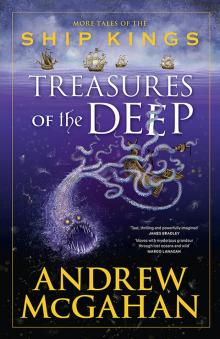 Treasures of the Deep
Treasures of the Deep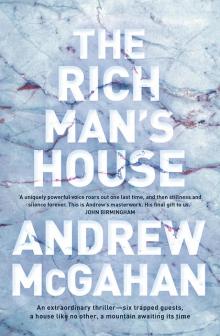 The Rich Man’s House
The Rich Man’s House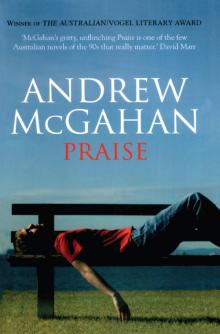 Praise
Praise The White Earth
The White Earth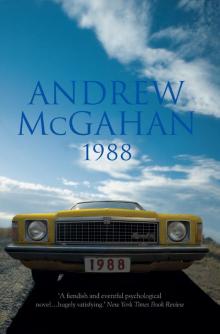 1988
1988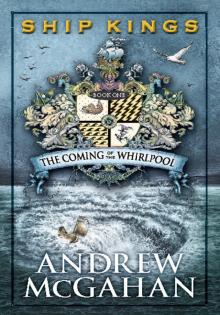 The Coming of the Whirlpool
The Coming of the Whirlpool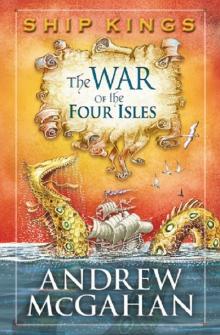 The War of the Four Isles
The War of the Four Isles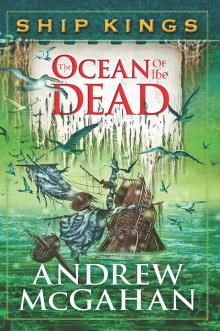 The Ocean of the Dead: Ship Kings 4
The Ocean of the Dead: Ship Kings 4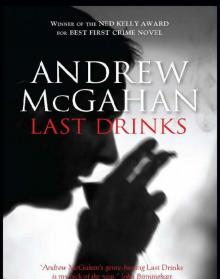 Last Drinks
Last Drinks Wonders of a Godless World
Wonders of a Godless World Underground
Underground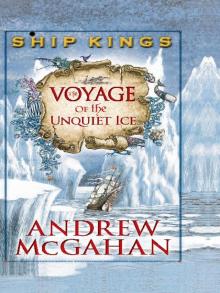 The Voyage of the Unquiet Ice
The Voyage of the Unquiet Ice